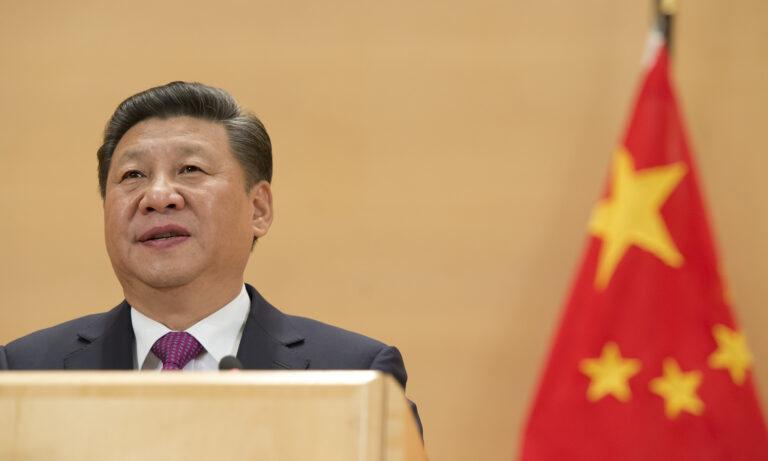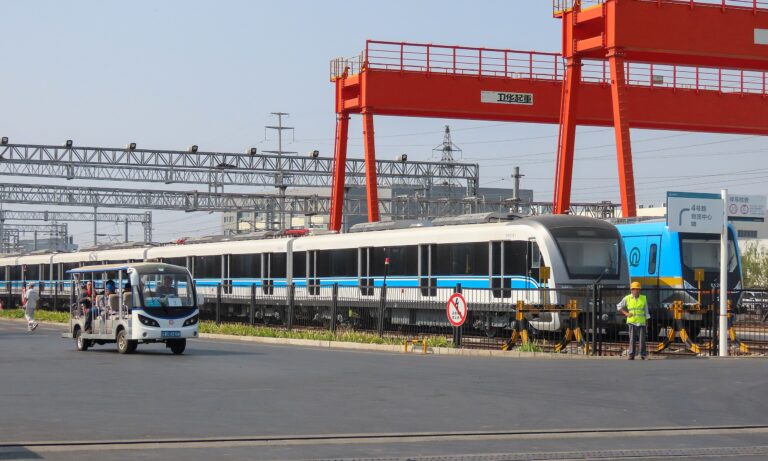
Despite limited cooperation so far, China maintains an interest in securing a footprint in Georgia, which occupies an important geostrategic position for China’s connectivity initiatives.
In December, Georgian Prime Minister Irakli Garibashvili announced that the country would build a long-anticipated Anaklia Port on the Black Sea. While the state plans to hold a majority stake in the initiative, international competition will be announced to select additional partners.
Anaklia, the first deep sea port in the country, will have the capacity to receive large container vessels and can significantly increase Georgia’s transit potential and boost the economy. The port was viewed as an important asset by the former US Secretary of State Mike Pompeo, who saw it as a counterweight to Russian and Chinese influence. At the same time, Anaklia could provide an important window for Chinese companies to create a foothold on the Black Sea and deepen involvement in Georgia.
China in Georgia
From China’s perspective, Georgia’s main asset is its geography. Sandwiched between the Black and Caspian seas, Georgia and Azerbaijan provide a land bridge from Asia to Europe. This feeds into China’s Belt and Road Initiative (BRI) that Georgia joined in 2016. The country is positioning itself as an alternative route to Europe, bypassing Russia. While Georgia is not a member of the EU, the country enjoys a free trade agreement with the bloc, making it attractive for investment in the region.
Following Russia’s full-fledged aggression against Ukraine, the question of diversifying trade routes from Asia to Europe has garnered a lot of interest. Here too, Georgia plays a role. The existing shipping lanes between China and Europe run via the northern route through Russia and by sea using the Suez Canal. If fully developed, the Middle Corridor, which includes Kazakhstan, Azerbaijan, Georgia, and Turkey, can act as an alternative for Chinese goods to reach Europe without using the land bridge through Russia.
A recent meeting between the Chinese Foreign Minister Wang Yi and the Georgian Prime Minister shows China is interested in cultivating this option further. However, due to the insufficient infrastructure, the Middle Corridor still lags in delivery speed and cost compared to the existing shipping lanes, making the option less attractive.
While China’s focus on Georgia is increasing, relations with Moscow and Central Asian nations take precedence for Beijing. Many analysts predicted that China’s growing interest in Georgia could lead to China acting as a counterbalance to Russia, ensuring Georgia’s stability.
From today’s vantage point, it is clear that these expectations were grossly exaggerated. China’s division of labor with Russia in the South Caucasus leaves the management of security aspects to Moscow while Beijing builds economic influence. However, Georgia’s hopes that China would invest enough to significantly boost its economy have also not yet materialized.
Chinese Economic Presence in Georgia
Georgia and China signed a free trade agreement in 2017, making the country the only one in the region with such a deal. China is Georgia’s third largest trading partner, preceded by Turkey and Russia. China’s Xinjiang-based Hualing Group has made significant investments in Georgia.
China’s most visible presence in Georgia focuses on infrastructure projects that span the country. Western donors and the Asia Development Bank fund many leading projects, but the Chinese companies have secured the largest tenders and are the sole implementers.
Over a dozen Chinese companies currently work on constructing and reconstructing roads and railways, improving connectivity. Unifying features of these companies are their links with the Chinese government and their dubious global standing. They carry high corruption risk, have often ended up on international blacklists, and have a record of mismanaged work locally. In addition, these companies are often intertwined with the local political elite, which eases their entry into the market.
As Georgia struggles with weak state institutions and what has been termed as “state capture,” China finds few obstacles when operating there. In their dealings with China, Georgian authorities have exhibited a striking disregard for due diligence measures, even in sensitive industries.
Black Sea Ports
Georgia’s strategic importance is amplified by its access to the Black Sea, which makes it a significant player on the East-West transport corridor. Georgia currently operates Batumi and Poti ports, and while the Chinese investors do not own any of them, they have shown interest.
Despite the company’s questionable reputation, Georgian authorities handed over Georgia’s Black Sea Port of Poti’s Free Industrial Zone to the Chinese CEFC China Energy in 2017. The company went bankrupt after notorious criminal offenses worldwide came to light.
The Poti Free Industrial Zone is currently managed by the Eurasian Management Group, jointly owned by a subsidiary of the CEFC and Eurasian Invest LLC. Due to the Georgian court injunction, the Eurasian Management Group is controlled by a Georgian director with direct links to the ruling elite. Furthermore, the ownership of the majority stake in Eurasian Invest LLC can be traced to former Prime Minister Bidzina Ivanishvili. This puts Georgian owners in effective control of the port.
A bigger potential prize is Georgia’s Anaklia Port on the Black Sea. Unlike Georgia’s other Black Sea ports, Anaklia is suitable for large container vessels, making it much more attractive for shipping. The port is yet to be built, but the government is moving ahead with the project. In 2020, the Georgian government canceled the original construction deal, which included Western investment in the initiative. Back then, a Chinese company also put in a bid but later withdrew from the competition.
Russia strongly opposed the project in the past, considering the port could potentially be used by Western warships and submarines. As the Georgian authorities re-started the project in December, the option that Anaklia could eventually end up in the Russian or Chinese hands remains on the table.
Soft Power Influence
Despite the growing engagement, there is a significant lack of awareness in Georgia about Chinese foreign policy and influence campaigns. Georgian attitudes towards China are primarily neutral. More than half of the population thinks relations with China are good, but only 4 percent agree that China is an important political partner for Georgia.
Threats coming from Russia understandably dominate the country’s security discussion, with two Georgian regions currently occupied. As a result, Georgian media rarely cover issues connected with China in global affairs, and China exercises no effective influence in the Georgian media space.
Integration with the West remains a priority for most of the population, and Chinese cultural and educational initiatives garner no concern or scrutiny. However, China is expanding its soft power footprint in Georgia, where academia is the biggest beneficiary.
Georgian universities house three Confucius Institutes across the country. Additionally, Georgia has established the Georgian-Chinese Center for Economic and Cultural Development and Georgian-Chinese Friendship Association (GCFA), which partners with local universities. China’s Friendship Associations, similar to Confucius Institutes, are viewed as promoters of Chinese influence abroad. Among other avenues, China’s efforts to cultivate a positive environment also extend to media trips for Georgian journalists.
Another noteworthy feature of the growing Chinese soft power in Georgia is university scholarships for Georgian students. Until recently, foreign education was thoroughly dominated by Western programs and financing. As Western funds shrink, China has stepped in to offer an alternative. While small in number, China awards generous state scholarships to Georgian students that cover full tuition and board and attract broad student interest.
It is noteworthy that the Georgian Ministry of Education formally cooperates with the Chinese Embassy to offer Mandarin Chinese classes and popularize Chinese culture in Georgia’s secondary schools. The agreement has not yet gained significant traction but has potential if duly funded and implemented. The COVID-19 pandemic significantly disrupted cooperation, putting student exchanges and teaching of the Chinese language in Georgia on hold. However, with the end of the zero-COVID policy and gradual return to normalcy in China, the cooperation promises to pick up speed again.
Stumbling Blocks
There remain significant limitations to Georgia-Chinese cooperation. The main obstacle is heightened geopolitical competition between the West and China, which prompts smaller states like Georgia to choose sides.
The Georgian public is overwhelmingly pro-Western, and Georgia has so far sided with the West on key political issues. For example, thus far, Huawei has not accessed Georgia’s 5G market as the country chose to conclude a memorandum of understanding with the US instead.
However, Georgia has been suffering from gradual democratic backsliding that has led to an overt demonstration of anti-Western stance among the ruling elite. This is particularly apparent in Georgia’s dealings with Russia in the backdrop of the war in Ukraine. Georgia has refused to join Western sanctions on Russia and has accused the US of trying to drag Georgia into a military confrontation with the Kremlin. While the West demands democratic reforms from Georgia, the authorities push back and portray Western engagement as meddling in the country’s domestic affairs.
As a result, fears that Georgia’s democratic rollback could lead to a full-fledged geopolitical turnaround are real, which may also have ramifications for ties with China.
Written by
Irina Arabidze
IrinaArabidzeIrina Arabidze is a visiting lecturer at the Caucasus University in Tbilisi, and a regular contributor to the online media outlet Tabula. As a Fulbright scholarship recipient, Irina holds a master’s degree in International Affairs from the Bush School of Government and Public Service at Texas A&M University and a graduate degree in International Relations and European Studies from the Central European University.


